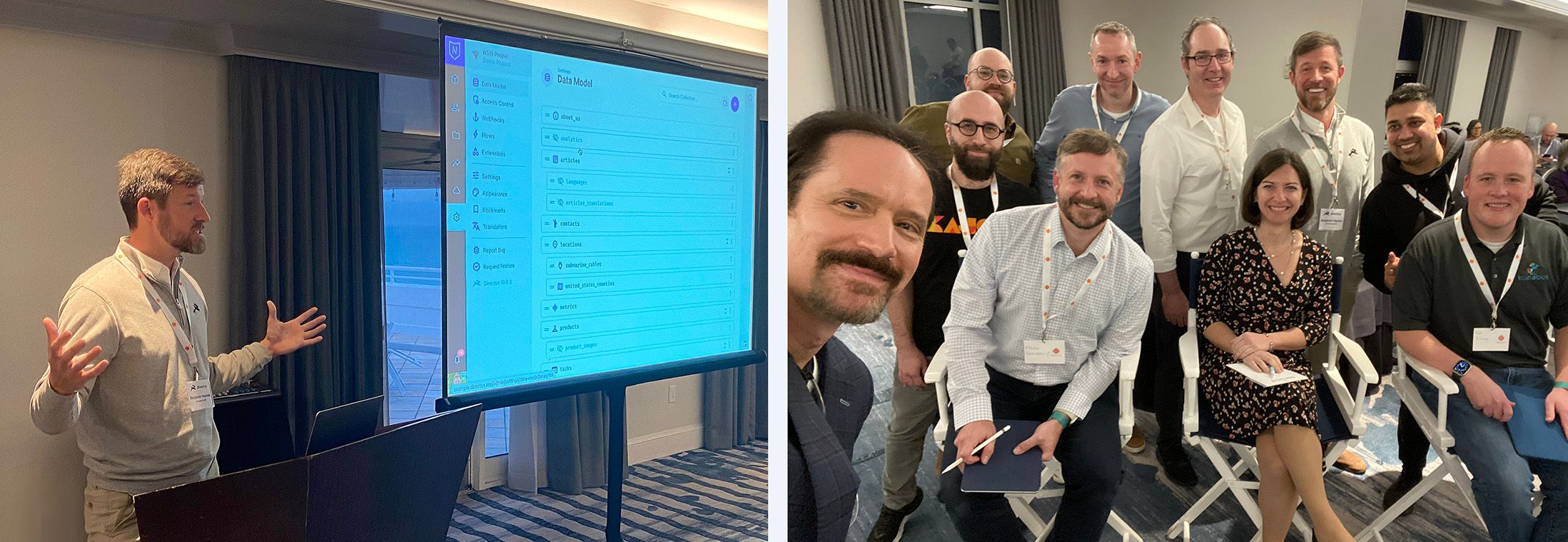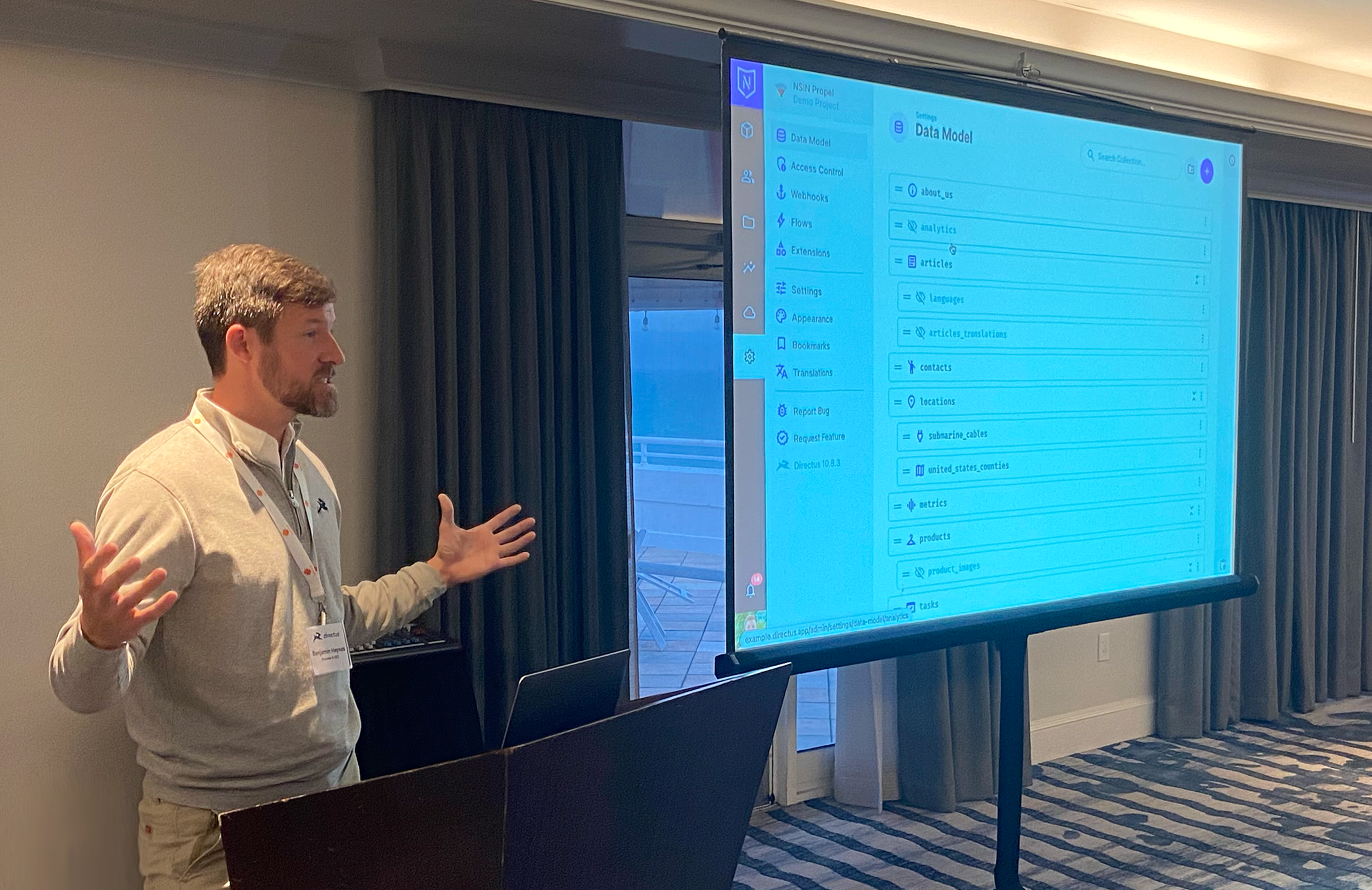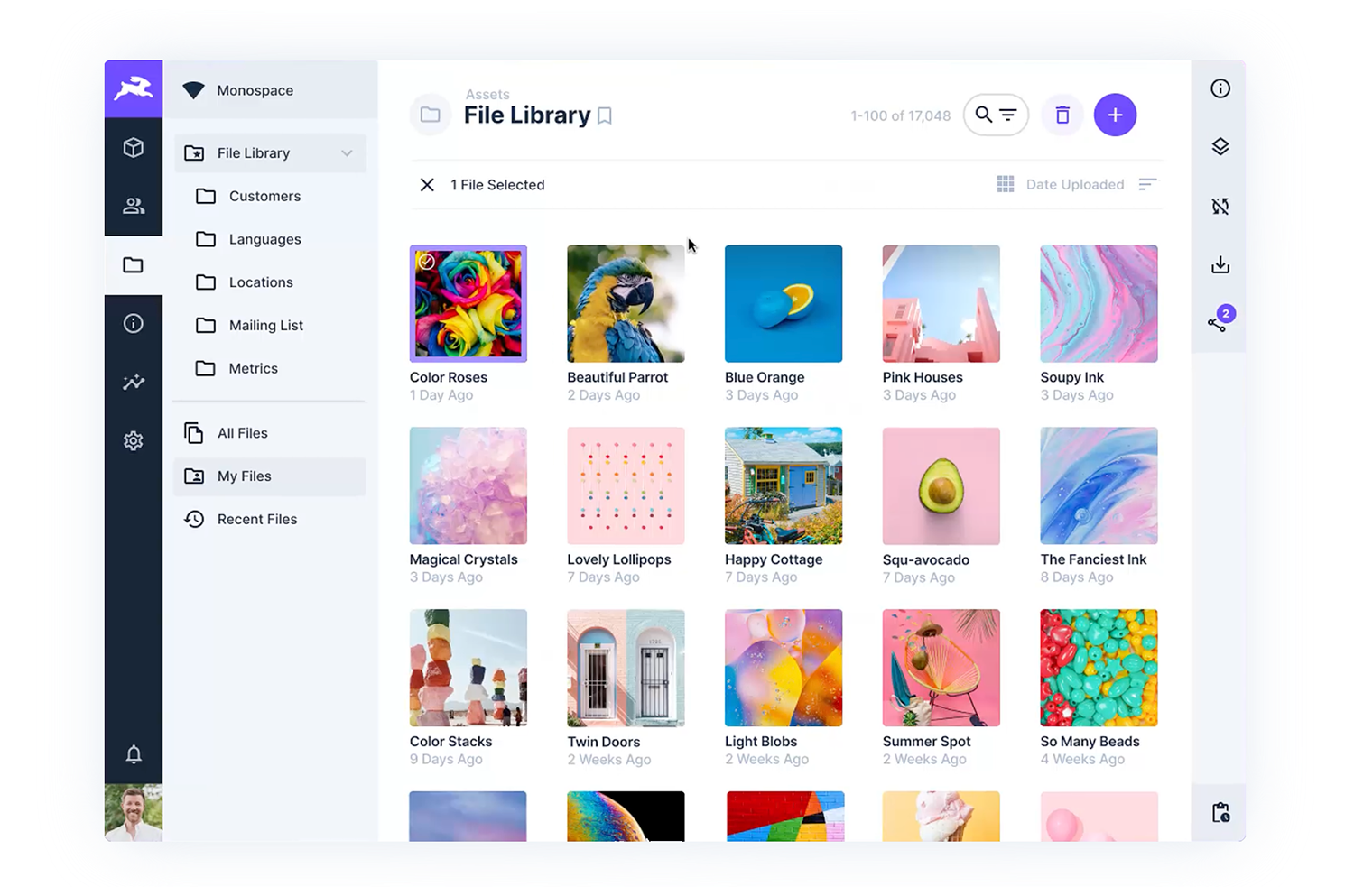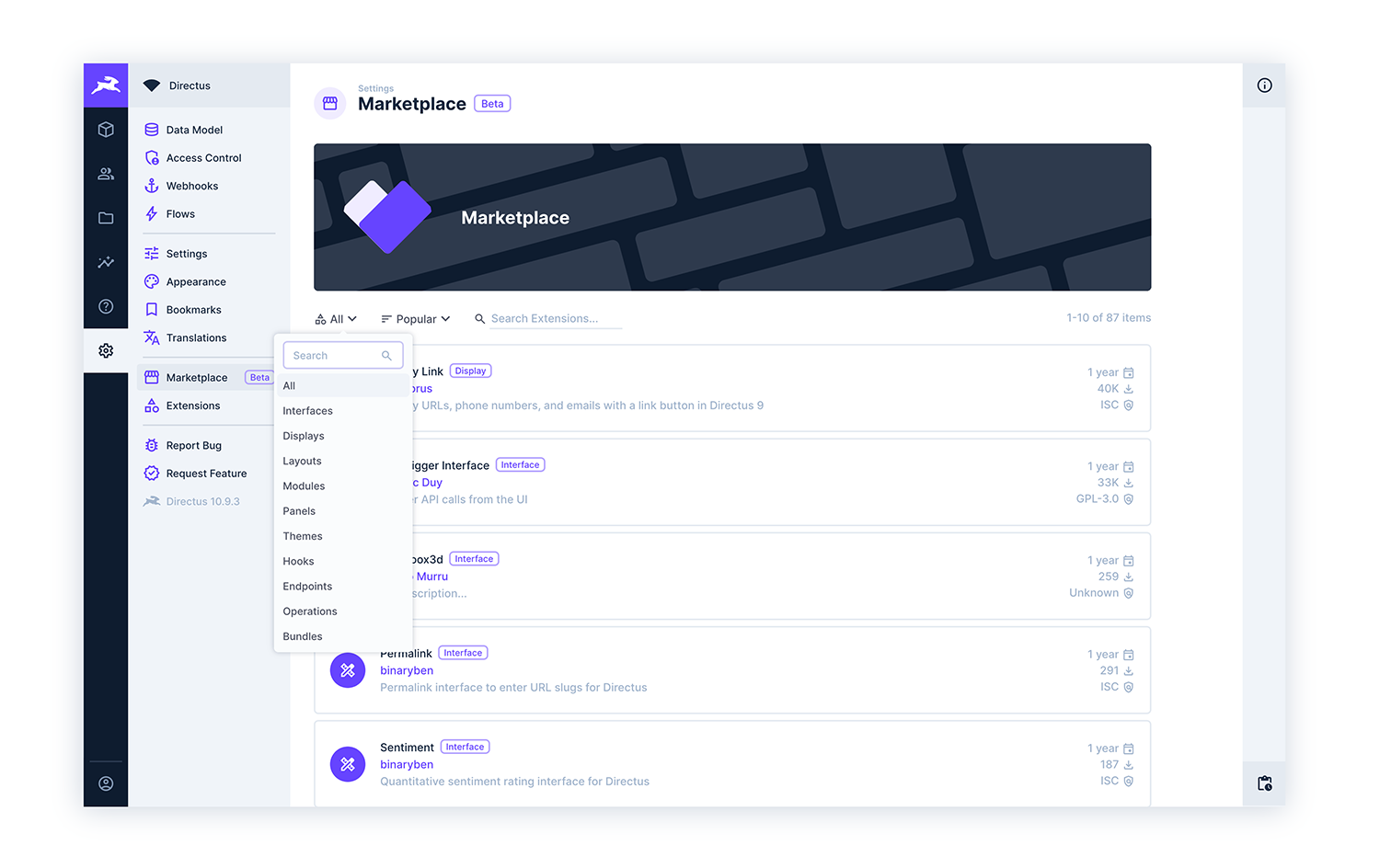New Directus Marketplace Completes a Three-Legged Stool for the Composable Future

The modern data platform is evolving its headless CMS and BaaS solution with the launch of an extensible marketplace of extensions. Q&A with Ben Haynes, CEO and Founder.
As a father to a somewhat fully-grown human, I can now draw analogous similarities betwixt parenthood and entrepreneurship.
In addition to watching my son come into the world and now matriculate to a respected university – where, as I’m often reminded, he now knows everything – I’ve birthed a couple of startups and had the good fortune of consulting with multiple companies that have been acquired by larger entities (including IBM and Tech Data).
I am by no means an expert at any of it. And let me really emphasize the parenting part. I’m still figuring things out as I go, but I’ve learned a lot along the way. Experience, as they say, is the best teacher.
Perhaps it's kismet that Ben Haynes now has his own 20-year-old, so to speak. While not quite the flesh-and-blood variety, it still represents two decades of hard work and a community of people to raise, nurture, and help it thrive in the digital wilderness.
I’m referring to Directus, a composable data ecosystem that provides headless CMS and backend-as-a-service capabilities. The company has been keenly focused on democratizing data while remaining intentionally small, stable, and agile over its steady burn to success.
As the platform’s “father,” Ben has been on a two-decade sprint developing the open source platform, thoughtfully crafting its arc and building a fiercely loyal following. Those efforts have paid off big time, starting with a Series A round of $7 million in 2022 and a hearty pace of product innovation over the last year.
As Directus enters what Ben qualifies as a stage of hypergrowth – amassing over 50,000 members in its Directus Cloud, building a 100K developer community, and earning 23,000+ Github stars – the company has just released its new Marketplace. The ecosystem will be home to a wide range of app and API resources, with a focus on developer-contributed extensions.
The beta launch is a milestone moment for Ben, who has always envisioned this as a key accomplishment in a years-long journey.
“Since the beginning, I have referred to the Directus ecosystem as a three-legged stool,” he said, reinforcing how this manner of structure – by design – can’t wobble. The first two pieces, Core and Cloud, have served as the foundational legs and represented the bulk of the progress. But Marketplace adds a missing piece that completes the vision, and one that represents a clear benchmark of success for CMS vendors.
I connected with Ben just as he and Rijk van Zanten – the company’s co-founder and CTO – were about to break the news. Even as the market (and the world at large) seem to be wobbling in unpredictable ways, it’s clear that Directus is finding stable ground as it plans its next chapter of growth.
Built on passion and principle
I first met Ben at the Boye & Company CMS Kickoff in St. Petersburg this past January, where he gave a compelling presentation during the iconic “CMS Idol” competition. This is a friendly fight where CMS vendors show off their old-school demo skills as industry judges call the blows. I emceed the event, so I had an up-close view of Directus in action.

(Left) Ben Haynes during his CMS Idol pitch. (Right) The “CMS Idol” participants and judges.
 To say it’s impressive is an understatement. Every aspect of the UX is intuitive and elegantly designed, and it really endeavors to embrace composability at its core. It's flexible and configurable to be sure – but at the same time, it's evolving beyond the charter of a single-use headless CMS by incorporating features like a native PIM, digital asset manager, and customizable data visualization.
To say it’s impressive is an understatement. Every aspect of the UX is intuitive and elegantly designed, and it really endeavors to embrace composability at its core. It's flexible and configurable to be sure – but at the same time, it's evolving beyond the charter of a single-use headless CMS by incorporating features like a native PIM, digital asset manager, and customizable data visualization.

If you haven't already, I highly recommend experiencing Directus via the company’s signature Directus TV (it's fun and animated) or by getting started for free on its website.
While all the CMS Idol participants gave fantastic pitches, Ben beamed throughout his 6 minutes in a way that can only be described as paternal pride. That sentiment was later codified during the awards presentation, where he was declared the winner by a large margin. The only problem? Ben was missing in action.
Turns out he had a call with some VIP customers: his kids.
And that might say everything you need to know about Ben Haynes. He’s a committed dad who’s poured his heart into his creations. He’s met challenging decisions on the road, delaying funding until the platform was properly tuned for the next stage of its growth. As he noted in a recent blog that counters the illusion of being an “overnight success,” he reinforced that he was never in it for the “quick buck,” and wanted to build a premium product that would stand the test of time.
It takes a special person to embrace that long-game thinking – especially in software. In fact, when I spoke to Matt Minor, who runs lead gen at Directus, he said Ben was the best person he’s ever worked for. Earning that kind of respect communicates just how much passion spills down through the ranks.
Now, as Marketplace emerges as the next era in the company’s evolution, it’s clear that the people – both builders and users – are what makes this company unique in an exploding landscape of CMS choices. And Ben has cultivated that culture in abundance.
What’s in the new Directus Marketplace?
As the name implies, Marketplace is a storefront that expands the functionality of the Directus composable CMS. It will offer a wide blend of app, API, and hybrid extensions – everything from modules to hooks to themes.

While this launch is generally available, it’s the beginning of an ongoing development journey, and far from done. But even at the get-go, there’s lots to offer.
“There are a few hundred extensions already in the wild that will be aggregated into the Marketplace,” Ben said, “and then the Core Team will be continually adding additional extensions over time. The new developer experience for building these extensions is actually part of the release, so this velocity will be increasing post-announcement.”
You can learn more about the different types of extensions via the Directus documentation, which offers an introductory overview.
One of the biggest differentiators of Directus from other market solutions is its extensibility and capacity for customization. The Marketplace embodies this next evolutionary step by providing a truly composable experience for users. Previously, this extensibility was limited to a more technical crowd. But Marketplace changes the game, enabling almost any user to intuitively discover and download extensions to tailor their experience, regardless of technical skill, directly from within their instance.
Additionally, the Marketplace will be available for all customer cohorts, from Directus Cloud to self-hosted deployments.
“We pride ourselves in crafting our roadmap based on feedback and ideation from the broader community.”
As Ben reflected, much of the guidance around the Marketplace trajectory has come from their community of developers. This was most notably in the form of company-sponsored hackathons, including its recent AI Hackathon and Panel Hackathon. These events featured an array of cool experimental projects – everything from AI-powered image-to-text extraction to built-in translation services.
“Our hackathons have been an amazing primer of ideas,” he explained. “We are focused on pulling as much divergent thinking from our community and have formal feature request/voting systems built into our external GitHub Discussions and sales and marketing insight from the internal field. We pride ourselves in crafting our roadmap based on feedback and ideation from the broader community. Our job is to then distill those specific features into agnostic capabilities that straddle all of our use cases. This is a formal process at Directus, and we call it our Vision Feedback Loop.”
On that point: the company is also garnering feedback via its Discord #marketplace-beta channel.
An innovative approach to Marketplace Design
At its foundation, the Directus Marketplace will give developers a platform for building and surfacing their ideas to the market. In terms of delivery, Directus has adopted what it calls a “balanced marketplace model” that prioritizes both freedom and security. This vector supports a diverse range of community-contributed modules and extensions while maintaining critical and essential measures to maintain the platform’s integrity and trust.
According to Directus, the beta launch will focus on three key areas. The first is a security-first extension model, which will feature client-side or sandboxed server-side extensions with explicit permission requirements.
The second provides extension compatibility and author support across different Directus versions. This is key, as many legacy extensions coming from Core may be out of date. Marketplace will provide warnings for extensions that don't meet modern requirements, ensuring users feel more secure with an extension’s efficacy.
There’s also an npm integration that leverages the well-adopted JavaScript package manager as the primary registry source. This will simplify the process for extension authors to publish and update their contributions to the Marketplace.
Monetizing the future
As with all Marketplace experiences, there’s the question of monetization. While still early in the lifecycle, I wanted to know how this new ecosystem is going to be accessed and sustained, and ultimately if the available extensions will be free or at a cost. I also wanted to know how revenue-sharing opportunities – if any – would unfold for extension authors.
As Ben indicated, there’s a very thoughtful approach to how Directus will capitalize the Marketplace model, reflecting his company’s experience and mindset.
“We've seen the benefits of using staged releases to integrate real-world feedback into our development workflow,” he said. “This is Marketplace 1.0, and there will be many incremental improvements that roll out over the subsequent months — culminating in the commercial update in the second half of this year.”
That update will feature a revenue share for the Directus developer community, so engineers can start to generate income based on the extensions they create. The rest of the monetization model will continue to roll out over time.
“We're still exploring all the options for the pricing we will support – one-time, subscription, per-seat, et cetera – but it's certainly exciting.”
An intelligent strategy for AI
It’s impossible to talk about CMS right now without considering the impact of AI. It’s ubiquitous, hyperbolic, but also means something different to everyone. For those reasons, every CMS is either hustling to remain in parity with established generative AI features or developing completely novel capabilities powered by AI/ML (for which some have been doing well before the dawn of OpenAI).
I asked Ben what he and his team are most excited about with the Marketplace extension ecosystem. Interestingly, the Directus approach to AI influenced his answer.
“We’re most excited about the AI Extensions this unlocks,” he said. “We've intentionally kept AI out of the Core software, since it is opinionated, ever-changing, and often requires paid licenses or keys. Extensions allow us to build atomic AI integrations for automation, generation, and enrichment — which will undoubtedly be the biggest advancements users see within the Marketplace.”
That's intelligent, to say the least. AI is a moving target, and opinionated applications could very well be outmoded in months – or even weeks. We've seen it happen already as platforms invested in the addition of ChatGPT features that were quickly matched by outside tools, or even text editors like TinyMCE.
Being clear about the challenges
Change is rarely easy. In a recent blog post from Rijk van Zanten, he gets real about the challenges that lay ahead with the launch of the new Marketplace beta. There are obvious security risks when accepting externally-contributed extensions, and that risk is being handled with a gradual rollout of features.
As mentioned previously, compatibility is another potential drag. Currently, there are a host of existing Directus extensions that won’t run in the Marketplace by default – and will require some degree of refactoring. As Rijk points out, this isn’t ideal, but it is needed to build trust and security in the Marketplace from day one.
He further notes that it’s also a throat-clearing moment for Directus, allowing them to set the proper expectations for how extensions will be built in the future if authors want to distribute them.
I have to admit: the degree of transparency is refreshing, and that speaks volumes about the Directus culture. As much as they are touting the accomplishment of Marketplace, they’re very clear about the posture of the beta and its adherent limitations. They’re also offering solutions, like giving authors a path to migrate and leverage npm as a source registry.
Strengthening the legs to support the customer
In my exchange with Ben, I shared how I've personally used the “three legs of the tripod” metaphor to illustrate a similar construct to his “three-legged stool.”
Maybe it's my affectation for photography, but the essence is the same: Avoid the wobble. Find stability. Complete the vision.
But there’s more to it than that, and it has to do with Directus truly understanding its customers and users. Ben did a great job of summarizing how that plays out relative to Directus Core and the addition of Marketplace.
“What’s so important here is that Directus Core has an ‘80/20 rule,’ where we aim to get up to 80% of your needs [met] out of the box, but intentionally avoid trying to be 100%,” he said. From his perspective, that’s exhibiting the attributes of a monolith, and by achieving that last 20% through extensions and integrations, it breaks free of that albatross.
“The Directus Marketplace enables developers to get to 100% even faster than before by leveraging the skills and output of our 100k developer community.”
OK, so not a monolith, but also a place where lots of stuff – including PIM – is now accessible to users. Not just a headless CMS, but a composable data platform. So where does Directus fit?
As I mused about this, the idea emerged that “categories” might be one of the legs propping up the CMS industry. Now, as platforms race towards the middle – something I wrote about in my response to the 2024 Gartner MQ Report for DXPs – that pillar is becoming a little less stable.
Maybe that’s OK. Maybe we need to break the old paradigm to build stronger legs.
As platforms continue to evolve towards a more composable posture, it’s important to remember that the stool is holding up the customer – and that’s where Directus is really outperforming the market. Under Ben’s leadership, they’ve thoughtfully grown, agilely pivoting at the right places to reflect feedback from their users. They’ve never lost sight of that critical element of being open and community-focused, and that’s made all the difference. You can see that passion in their content and across their channels.
As for what’s next, Ben indicated that the company is focused on a new extension type called Templates, which will be a huge focus for Directus in 2024 with a host of new use cases. To say he’s excited is probably selling him short.
Look, everyone hates a wobble. And maybe they're unavoidable at some level. But Directus has really focused on engineering the right amount of flexibility into its three-legged model to endure slight shifts or an uneven topology. Finding balance is all about listening to your customers, which they’ve done from the beginning. And as long as you’re building a three-legged stool that puts them first, you're probably sitting in a good place.
Upcoming conferences

CMS Connect 24
August 6-7, 2024 – Montreal, Canada
We are delighted to present our first annual summer edition of our prestigious international conference dedicated to the global content management community. Join us this August in Montreal, Canada, for a vendor-neutral conference focused on CMS. Tired of impersonal and overwhelming gatherings? Picture this event as a unique blend of masterclasses, insightful talks, interactive discussions, impactful learning sessions, and authentic networking opportunities.

CMS Kickoff 25
January 14-15, 2025 – Tampa Bay Area, Florida
Join us next January in the Tampa Bay area of Florida for the third annual CMS Kickoff – the industry's premier global event. Similar to a traditional kickoff, we reflect on recent trends and share stories from the frontlines. Additionally, we will delve into the current happenings and shed light on the future. Prepare for an unparalleled in-person CMS conference experience that will equip you to move things forward. This is an exclusive event – space is limited, so secure your tickets today.
